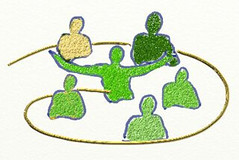A blog on social software, collaboration, trust, security, privacy, and internet tools by Christopher Allen.

One of the common practices in the independent movie industry is to share favors to keep production costs low. I loan you use of a camera and you later do some editing for me on the cheap. Of course, it is often actually less direct then that: I loan you the camera, the community knows that I am generous, and when I need some editing time on the cheap, my social capital in the film community makes the resource available to me.

Late this evening while catching up on my feeds, I saw for the first time that this year's Blog Action Day is on the topic of Climate Change. This event is sponsored yearly by Change.org. I wish I had known earlier as this would have been a great exercise for my sustainable MBA students at BGI.edu, as they are all creating their blogs this week for my class "Using the Social Web for Social Change".

I was musing as I was preparing for next week's Intensive at BGI that I have 21 students in my class, an uncomfortable size. That's because it lies between a smaller size where good conversations naturally occur, and a larger size where you can take full advantage of different activities that work well for larger groups.
I talk about this a bit in my Group Threshold and Dunbar Number posts, where I call the group threshold size of between 10 and 24 people the “Judas Number” nadir, or low point.

Passwords are very important for maintaining your online identity, because they ensure that no one else can access your accounts and do things that you wouldn't do. As such, you should make sure that your online passwords are as strong as possible. This article will provide some general guidelines for doing so.
Multiple Passwords Note that I said that you want to ensure your passwords, plural, are strong. That's because you'll want at least two.

We live in a world of conversation, of language; all full of words. Mastery of language requires learning the meanings of thousands of words. The average native English language speaker uses in the realm of 12,000 to 20,000 words, whereas a college graduate would use 20-25,000 words. Shakespeare actively used more then 30,000 words, and his vocabulary was estimated to be over 66,000 words. Yet there are, at the very least, a quarter of a million distinct English words, excluding inflections, and words from technical and regional vocabularies.

Starting next week I will be teaching a course at the Bainbridge Graduate Institute on the topic of "Using the Social Web for Social Change".
BGI offers an MBA and Certificate program for professionals to learn how to build enterprises that are financially successful, socially responsible and environmentally sustainable. Students have to learn everything that they'd have to learn in an ordinary MBA program — profit and loss, how to read a balance sheet, business plan creation, macroeconomics, quantitative analysis, corporate strategy, how to manage and motivate people, and a basic understanding of all the components of business such as operations, marketing, distribution, sales, etc.

Last year I participated in a survey followed up by a focus group on the topic of Noncommercial Use, in particular around the context that about 2/3rds of the Creative Commons licenses extant use the NC attribute, such as in CC-BY-NC.
Defining "Noncommercial": A Study of how the Online Population Understands "Noncommercial" Use
http://wiki.creativecommons.org/Defining_Noncommercial
The topic is somewhat of a sticky one, as there are many competing interests. There are content creators who wish to profit from their work, there are other content creators who don't want anyone to profit (even themselves), and of course there are content creators who want everything to be free provided you share free content back.

In my first article in this series I talked about community numbers: how the sizes of groups ultimately affect their success (or failure). However what I discussed only offers up the most rudimentary explanation of the dynamics, and that is because typically not all of the members of a group are equally involved.
In order to better define who constitutes the tightly-knit "participant community" upon which the group thresholds act, we have to study power laws which let us measure the intensity of individuals' involvement in a group.

In my previous post, I talked about the limits on sizes of tightly-knit communities. These group limits are closely related to a number of interesting personal limits, and are often confused with them.
Unlike the group limits, personal limits actually measure something different: the number of connections that an individual can hold. They're yet another thing that you must consider when thinking about communities of people.
Personal Limits The Support Circle: This is the number of individuals that you seek advice, support, or help from in times of severe emotional or financial stress.

We often think of communities as organic creatures, which come into existence and grow on their own. However, the truth is they are fragile blossoms. Although many communities surely germinate and bloom on their own, purposefully creating communities can take a tremendous amount of hard work, and one factor their success ultimately depends upon is their numbers.
If a community is too small you'll often have insufficient critical mass to sustain it.

This blog has been quiet lately as I've been doing a lot of work in the last year on the iPhone. I've been speaking at conferences like eComm 2008 (presentation, video from panel), writing an book on the iPhone with my co-author Shannon Appelcline called iPhone in Action: Introduction to Web and SDK Development (first two chapters free), and I am one of the organizers for the upcoming iPhoneDevCamp 2, a MacHack style conference on August 1st-3rd, and I am working on some social software apps for the iPhone.

I'm in Seoul, South Korea this week for the 13th Global Forum on Business Driven Action Learning and Executive Development, where I'm presenting on the topic of the how to get involved with the Social Web.
My presentation is an offshoot of an odd sideline of mine, executive blog and social web coaching. Basically, many times over the last couple of years I've been asked by colleagues and friends to help them with the social web.

I feel privileged and honored to have been part of the iPhoneDevCamp this last weekend. Over 380 iPhone developers came out to the Adobe Campus in San Francisco to help each other make the best possible web pages and webapps for the iPhone.
I was the keynote speaker on Saturday and Master of Ceremonies for the MacHack-style Hack-a-Thon Demo on Sunday.
At the Hack-a-Thon almost 50 iPhone web applications were demonstrated to an enthusiastic audience.

I've been excited about the web capabilities of the upcoming iPhone for some time. As a reluctant laptop user ("oh, my aching shoulders"), there is real appeal to me in a better portable web browser. I have tried most of the PDA and cellphone browsers to date, and none offer more then a poor cousin to the web that we experience on the desktop.
Instead, the iPhone offers a desktop-class browser.

by Christopher Allen & Shannon Appelcline
[This is the fourth in a series of articles on collective choice, co-written by my collegue Shannon Appelcline. It will be jointly posted in Shannon's Trials, Triumphs & Trivialities online games column at Skotos.]
Last year in Collective Choice: Rating Systems we took a careful look at eBay and other websites that collect ratings, and used those systems as examples to highlight a number of theories about how to make rating systems more useful.
I will be speaking tonight at WikiWednesday on the topic of Same Time, Different Place Editing, and will be demonstrating SynchroEdit integration with MediaWiki and EditThisPagePHP. If you are interested, see you tonight (Wednesday) at 6-8pm, at Socialtext. original layout

My colleague, Shannon Appelcline, has been working on a game rating system for RPGnet. This has resulted in real-world application of the principles for designing rating systems which we've previously discussed in our Collective Choice articles. Shannon's newest article, Ratings, Who Do You Trust? offers a look at weighting ratings based on reliability.
On the RPGnet Gaming Index we've put this all together to form a tree of weighted ratings that answer the question, who do you trust?

Last May I did an abbreviated version of my Dunbar Number talk at MeshForum 2006. A MP3 podcast of that talk is now available at IT Conversations or can be downloaded here (10mb).
If you'd like to follow along, here is a pdf copy of my presentation sides (10mb).
Biggest addition to what I've written about before is some discussion about different kinds of social software and what what size groups they seem to be appropriate for.

In Collective Choice: Rating Systems I discuss ratings scales of various sorts, from eBay's 3-point scale to RPGnet's double 5-point scale, and BoardGame Geek's 10-point scale.
Of the various ratings scales, 5-point scales are probably the most common on the Internet. You can find them not just in my own RPGnet, but also on Amazon, Netflix, and iTunes, as well as many other sites and services. Unfortunately 5-point rating scales also face many challenges in their use, and different studies suggest different flaws with this particular methodology.

I will be speaking next Tuesday (July 11th) at the monthly meeting of BayCHI, the San Francisco Bay Area Chapter of ACM SIGCHI (Computer Human Interface Special Interest Group), along with Michael H. Goldhaber.
The synopsis of my topic is:
The Dunbar Number, Unstructured Trust, and Why Groups Don't Scale
We are relying increasingly on internet-mediated social software tools for our day-to-day interaction with other people. To design this type of software, we must better understand the psychology and social dynamics of individuals in groups.
 One of the common practices in the independent movie industry is to share favors to keep production costs low. I loan you use of a camera and you later do some editing for me on the cheap. Of course, it is often actually less direct then that: I loan you the camera, the community knows that I am generous, and when I need some editing time on the cheap, my social capital in the film community makes the resource available to me.
One of the common practices in the independent movie industry is to share favors to keep production costs low. I loan you use of a camera and you later do some editing for me on the cheap. Of course, it is often actually less direct then that: I loan you the camera, the community knows that I am generous, and when I need some editing time on the cheap, my social capital in the film community makes the resource available to me.












